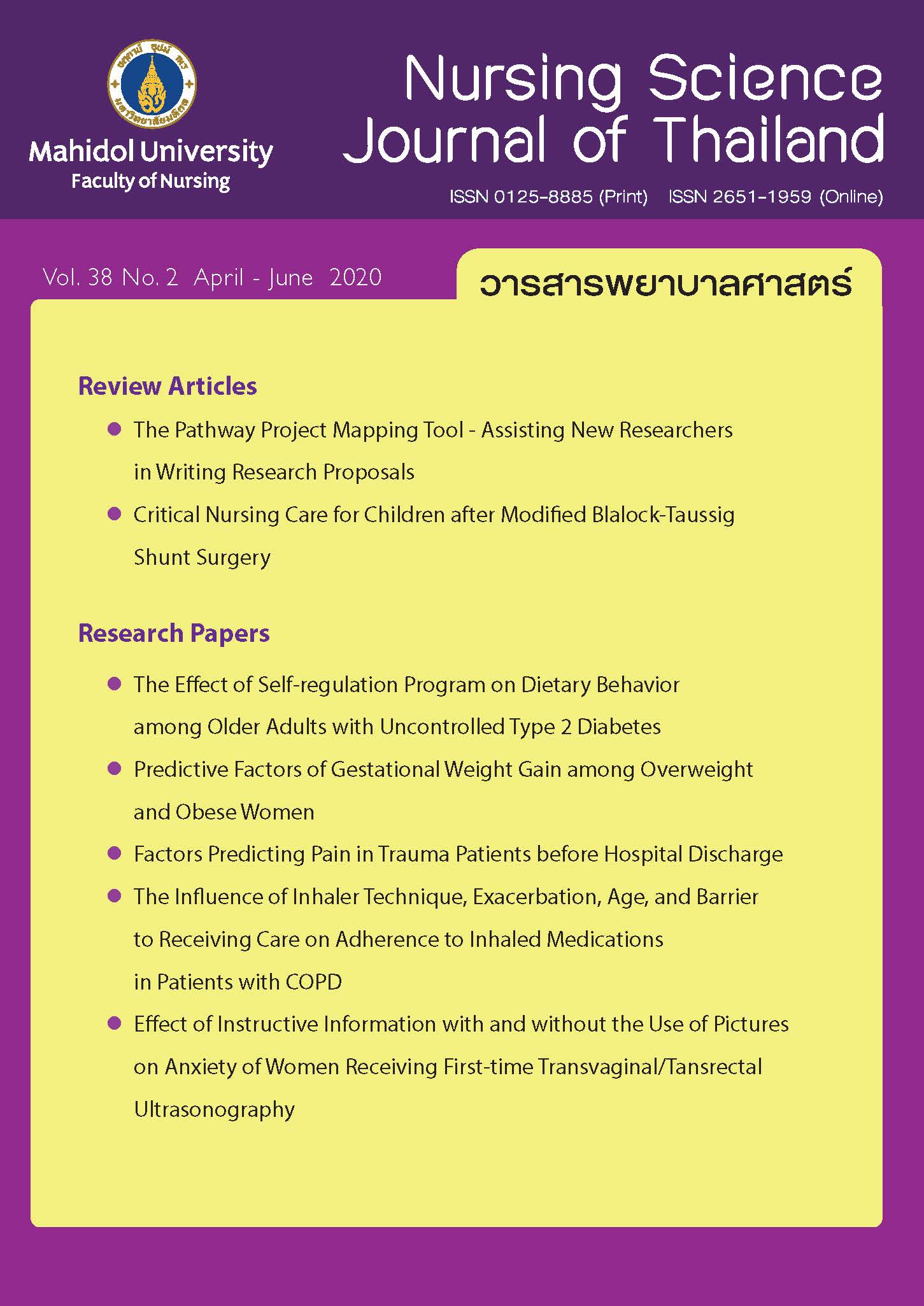The Effect of Self-regulation Program on Dietary Behavior among Older Adults with Uncontrolled Type 2 Diabetes
Main Article Content
Abstract
Purpose: To examine the effect of self-regulation program on dietary behavior among older adults with uncontrolled type 2 diabetes.
Design: Randomized controlled trial.
Methods: The sample was 54 older adults with uncontrolled type 2 diabetes. The participants, who received treatment from a diabetes clinic at a community hospital in Trang province, were randomized using complete block design and divided into experimental and control groups with 27 participants each, based on inclusion criteria. The self-regulation program based on the integrated health behaviour change theory was conducted over a period of 8 weeks. The experimental group received both routine care and educational sessions with group activities at weeks one and two followed by telephone monitoring at weeks three, five and seven. The control group received only routine care. Their dietary behavior was assessed at baseline and at week nine. Data were analyzed by descriptive statistics, chi-square test, and t-test.
Main findings: At week nine, the mean difference in dietary behavior of the experimental group was significantly higher than that at baseline (p < .001) and of the control group (p < .001).
Conclusion and recommendations: This study showed that the self-regulation program was effective by enhancing dietary behaviour within 8 weeks. Nurses should apply this program with older adults with uncontrolled type 2 diabetes to enhance their dietary behavior.
Article Details
Copyright Notice: Nursing Science Journal of Thailand has exclusive rights to publish and distribute the manuscript and all contents therein. Without the journal’s permission, the dissemination of the manuscript in another journal or online, and the reproduction of the manuscript for non-educational purpose are prohibited.

Disclaimer: The opinion expressed and figures provided in this journal, NSJT, are the sole responsibility of the authors. The editorial board bears no responsibility in this regard.
References
Aekpalakorn W. Thai national health examination survey, NHES V. Nonthaburi: Health Systems Research Institute; 2014. 277 p. (in Thai).
Bureau of Elderly Health. Report of the 2013 Thai health status survey under the health promotion program for the elderly and the disabled. Nonthaburi: Wacharin PP Printing; 2013. 87 p. (in Thai).
Kirkman MS, Briscoe VJ, Clark N, Florez H, Haas LB, Halter JB, et al. Diabetes in older adults. Diabetes Care. 2012;35(12):2650-64. doi: 10.2337/dc12-1801.
Jiamrungsri W. Epidemiology, prevention and promotion of self-management of type 2 diabetes mellitus. Bangkok: Text and Journal Publication; 2017. 407 p. (in Thai).
Usay P, Muangsom N, Kowit P. Factors associated with glycemic control among type 2 diabetes mellitus patients attending tambon health promotion hospitals within the Banphai hospital’s catchment area, Khon Kaen province. KKU Journal for Public Health Research. 2012;5(3):11-20. (in Thai).
Ziaee A, Afaghi A, Sarreshtehdari M. Effect of low glycemic load diet on glycated hemoglobin (HbA1c) in poorly-controlled diabetes patients. Glob J Health Sci. 2012;4(1):211-6. doi: 10.5539/gjhs.v4n1p211.
Pethchit R. Self-care behaviors and blood sugar control among patients with diabetes mellitus at Khiensa hospital, Suratthani province. The Southern College Network Journal of Nursing and Public Health. 2015;2(2):15-28. (in Thai).
Fuangfung S, Kaveevivitchai C, Piaseu N. Effects of diet control program using food exchange on knowledge, health behaviors, and blood glucose levels among persons with type 2 diabetes in district health promoting hospital. Journal of Public Health Nursing. 2015;29(3):34-49. (in Thai).
Jantraporn R, Pichayapinyo P, Lagampan S, Mayurasakorn K. Effects of carbohydrate reduction program and telemonitoring on glycosylated hemoglobin in patients with poorly controlled type 2 diabetes: a randomized controlled trial. J Med Assoc Thai. 2019;102(5):523-9.
Savoie MR, Mispireta M, Rankin LL, Neill K, LeBlanc H, Christofferson D. Intention to change nutrition-related behaviors in adult participants of a supplemental nutrition assistance program–education. J Nutri Health. 2015;47(1):81-5. doi: 10.1016/j.jneb.2014.08.009.
Wright I, Safaii S, Raidl M, Buck JH, Spencer MR, Sant, LL, et al. Effectiveness of the healthy diabetes plate and social media project. J Nutr Health. 2015;1(2):6. doi: 10.13188/2469-4185.1000007.
Yamauchi K, Katayama T, Yamauchi T, Kotani K, Tsuzaki K, Takahashi K, et al. Efficacy of a 3-month lifestyle intervention program using a Japanese-style healthy plate on body weight in overweight and obese diabetic Japanese subjects: a randomized controlled trial. Nutr J. 2014;13:108. doi: 10.1186/1475-2891-13-108.
Bowen ME, Cavanaugh KL, Wolff K, Davis D, Gregory RP, Shintani A, et al. The diabetes nutrition education study randomized controlled trial: a comparative effectiveness study of approaches to nutrition in diabetes self-management education. Patient Educ Couns. 2016;99(8):1368-76. doi: 10.1016/j.pec.2016.03.017.
Ryan P. Integrated theory of health behavior change: background and intervention development. Clin Nurse Spec. 2009;23(3):161-70; quiz 171-2. doi: 10.1097/NUR.0b013e3181a42373.
Suksan N, Kespichayawattana J. Effects of promotion self-regulation program on eating
behaviors and waist circumference in older patients with Obese Diabetes. Royal Thai Navy Medical Journal. 2017;44(3):85-102. (in Thai).
Glass GV. Primary, secondary and meta-analysis of research. Educ Res. 1976;5(10):3-8. doi: 10.2307/1174772.
Pitisutthitham P, Pichiansunthorn C. Textbook of clinical research. Bangkok: Vaccine Center, Faculty of Tropical Medicine, Mahidol University; 2018. 660 p. (in Thai).
Train the Brain Forum Committee (Thailand). Thai mental state examination. Siriraj Hospital Gazette. 1993;45:359-74.
Chaiarsa P, Sukamwang K, Pramoch A. Effect of self-efficacy and social support enhancement program on food consumption behavior among the elderly with diabetes mellitus. Nursing Journal. 2008;35(3):59-71. (in Thai).
Idaho Plate Method. Booklet-how to use the Idaho Plate Method for diabetes meal planning [Internet]. Rock Springs, WY: Idaho Plate Method; 2019 [cited 2018 Nov 25]. Available form: http://www.platemethod.com/downloads.html.


